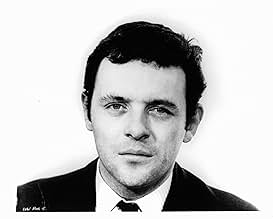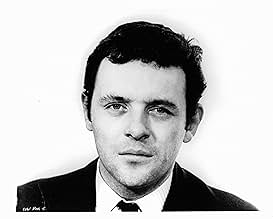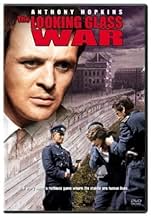IMDb RATING
5.8/10
1.6K
YOUR RATING
From the John le Carré novel about a British spy who sends a Polish defector to East Germany to verify missile sites.From the John le Carré novel about a British spy who sends a Polish defector to East Germany to verify missile sites.From the John le Carré novel about a British spy who sends a Polish defector to East Germany to verify missile sites.
Featured reviews
The film is part allegory on the WWII betrayal of Poland by the United States (under FDR) and Britain, which like the main character (now obscure cult icon) Christopher Jones is used and then abandoned. Not to spoil, I will just mention there is a nice one-liner quote from one of the character that touches on both main themes in one shot. (Have to now read the John le Carré novel to see if it's in there or from the screenwriting). The location migrates from Great Britain in the half to East Germany in the second. The main character Leiser (Christopher Jones) is a Pole who is recruited and exploited for the UK government/military war-related mission (locating rockets) and who is sent to East Germany (hostile) in return for promise of citizenship.
The other major theme is a straightforward counterculture anti-war mongering theme, but certainly not presented in a cliche manner - quite the opposite and film must be viewed to its full conclusion to witness. Very simple and digestable theme for any viewer to get, regardless if they are educated in deeper history or not. So the film is effective thematically without knowing the deeper obscure 'classified' references.
It's a straightforward thriller with a very clear mission, easy to follow in plot, and that develops into an especially interesting artistic form in its second half. The ending is effective and somewhat poignant final scene, where the main impact and revelation is experienced.
There is a good amount of symbolism buried within the film as well, which makes for a film worthwhile of subsequent viewing for film students. Film also has two large act with a shorter final conclusion, which swap locations and style. Lots of film technique, very subtlely presented and well-structured.
The cast is fantastic starring Christopher Jones, but also a younger prime Anthony Hopkins, Pia Degermark and even Susan George in an important scene.
A pleasant surprise representing buried and hidden historical allegory, but also for its equally noble anti-war theme --- both symbiotic and written with perfect synthesis.
I cannot speak for the book as far as adaptation, but knowing the history and war references as well as being literate and a fan of counterculture era film, this hit the mark. And it even makes me want to read the book as well.
Very interesting film. Obscure, subdued. Significant.
The other major theme is a straightforward counterculture anti-war mongering theme, but certainly not presented in a cliche manner - quite the opposite and film must be viewed to its full conclusion to witness. Very simple and digestable theme for any viewer to get, regardless if they are educated in deeper history or not. So the film is effective thematically without knowing the deeper obscure 'classified' references.
It's a straightforward thriller with a very clear mission, easy to follow in plot, and that develops into an especially interesting artistic form in its second half. The ending is effective and somewhat poignant final scene, where the main impact and revelation is experienced.
There is a good amount of symbolism buried within the film as well, which makes for a film worthwhile of subsequent viewing for film students. Film also has two large act with a shorter final conclusion, which swap locations and style. Lots of film technique, very subtlely presented and well-structured.
The cast is fantastic starring Christopher Jones, but also a younger prime Anthony Hopkins, Pia Degermark and even Susan George in an important scene.
A pleasant surprise representing buried and hidden historical allegory, but also for its equally noble anti-war theme --- both symbiotic and written with perfect synthesis.
I cannot speak for the book as far as adaptation, but knowing the history and war references as well as being literate and a fan of counterculture era film, this hit the mark. And it even makes me want to read the book as well.
Very interesting film. Obscure, subdued. Significant.
No, the movie didn't suck me in. I got sucked into watching it by some highly favorable comments. I should have paid more attention to the ratings.
If you want to watch LeCarre, there are much better examples than this. The pacing is completely off in this movie; as soon as something interesting starts, it is truncated for irrelevant meanderings. Apparently the director wanted to make this a "mood piece" rather than an action movie, and as a result, it never develops any momentum or suspense.
On balance, this is just a somewhat disappointing period piece. Watchable, but nothing more.
If you want to watch LeCarre, there are much better examples than this. The pacing is completely off in this movie; as soon as something interesting starts, it is truncated for irrelevant meanderings. Apparently the director wanted to make this a "mood piece" rather than an action movie, and as a result, it never develops any momentum or suspense.
On balance, this is just a somewhat disappointing period piece. Watchable, but nothing more.
Most of the reviews I have given are of films that I saw at the cinema upon its release and have then recently watched again. However, THE LOOKING GLASS WAR is a movie that I never got around to watching at the pictures, therefore, I decided to shell out 3 pounds and buy the DVD. I must say that I am glad I did as I quite enjoyed it. A young Christopher Jones plays a Polish seaman who is recruited by British Intelligence to go into East Germany to check out some missiles in return for being given leave to stay in the UK. The acting was better than I thought it would be and the storyline was OK. I liked the jazzy soundtrack as well. Not a bad film at all and worth the 3 quid I paid.
Made in 1969 this adaptation of a Le Carré novel isn't faithful to every element of the original book, and is heavily influenced by other contemporary films.
This means it isn't quite as uniformly bleak as many other Le Carré adaptations but depending on how you take it, it is perhaps hard to really believe in or sympathise with any of the characters. This is despite some pretty good performances by some of the lead actors.
What is perhaps missing is the clever editing, taut direction and sheer screen presence that (say) Michael Caine brings to the Harry Palmer movies (even though the plots of those are not exactly uniformly brilliant) or Richard Burton brings to "the spy who came in from the cold". Those movies stand head and shoulders above this.
Technically this film is well-photographed and the dubbing is well done too; however it is perhaps understandable if the pace of the film wanders, given that it looks a lot like they decided to shoehorn various sequences into the plot purely for stylistic reasons.
Some of the criticisms in the other reviews here are spot on and others are (IMHO) thoroughly misplaced; no spoilers here so you will have to work out which for yourself. I guess it is a bit of a curate's egg, this; "good in parts". Therefore if you approach it with suitable expectations you will probably find enough things about this movie to like to make it worth watching.
Overall this film probably isn't as bad as the knockers would lead you to suppose and nor is it as good as the 'ten' folk make out either. It is certainly an interesting period piece but it is also a little more than that too, so it gets 6/10 from me.
This means it isn't quite as uniformly bleak as many other Le Carré adaptations but depending on how you take it, it is perhaps hard to really believe in or sympathise with any of the characters. This is despite some pretty good performances by some of the lead actors.
What is perhaps missing is the clever editing, taut direction and sheer screen presence that (say) Michael Caine brings to the Harry Palmer movies (even though the plots of those are not exactly uniformly brilliant) or Richard Burton brings to "the spy who came in from the cold". Those movies stand head and shoulders above this.
Technically this film is well-photographed and the dubbing is well done too; however it is perhaps understandable if the pace of the film wanders, given that it looks a lot like they decided to shoehorn various sequences into the plot purely for stylistic reasons.
Some of the criticisms in the other reviews here are spot on and others are (IMHO) thoroughly misplaced; no spoilers here so you will have to work out which for yourself. I guess it is a bit of a curate's egg, this; "good in parts". Therefore if you approach it with suitable expectations you will probably find enough things about this movie to like to make it worth watching.
Overall this film probably isn't as bad as the knockers would lead you to suppose and nor is it as good as the 'ten' folk make out either. It is certainly an interesting period piece but it is also a little more than that too, so it gets 6/10 from me.
Frank Pierson made a very ambitious bet when he wrote the screenplay and directed the film version of John Le Carré's The Looking Glass War. I admire that ambition, but he only partially succeeded. The novel is a bitter, dark and gritty tale, with lots of satire, of old spymasters reliving their past glories. For that reason they are not up to the job of managing a modern and "Cold" War. Instead of "simply" telling that great and worthy story, Pierson seems to have been inspired by the Swinging 60's, with counterculture movements and young people everywhere pushing back against previous generations, to make an even bigger and more flamboyant statement of generational angst than Le Carré intended. This might have worked if executed well, but a few mistakes undercut him. He chose two beautiful, quirky, fast-rising stars, Christopher Jones and Pia Degermark as the leads. Jones' recruitment scenes were not believable, and neither was Degermark's two deus ex machina moments of entering the spy's life. But they were very nice to watch, and the very good cinematography helped, too. A few other turn-offs, for me were several tedious segments when I thought Pierson was channelling Michelangelo Antonioni, location shots that do not look like anyplace I've ever seen in Germany, as well an overly abrupt ending. In the end Pierson seems to have abandoned Le Carré's biting satire, and he jumbled the shift to generational angst.
Did you know
- TriviaThe voice of Christopher Jones was dubbed.
- GoofsThe photograph of a railway yard that was the pretext for the mission was supposedly taken in East Germany but the locomotive in the picture is immediately recognizable to any ex-trainspotter as a British Rail type manufactured by English Electric.
- Quotes
Leiser: What's your name?
John Avery: You can't have my name, it's a breach of security.
Leiser: You know, I'm risking my life for you so I want a name, give me a name, I don't care. Any name!
John Avery: John.
Leiser: John. John.
- ConnectionsFeatured in Al Murray's Great British Spy Movies (2014)
- How long is The Looking Glass War?Powered by Alexa
Details
- Release date
- Country of origin
- Official site
- Languages
- Also known as
- The Looking Glass War
- Filming locations
- Spain(made on location in Europe, kinema weekly 19/10 68)
- Production companies
- See more company credits at IMDbPro
Box office
- Gross US & Canada
- $168,000
- Runtime
- 1h 48m(108 min)
- Color
- Aspect ratio
- 2.35 : 1
Contribute to this page
Suggest an edit or add missing content







































